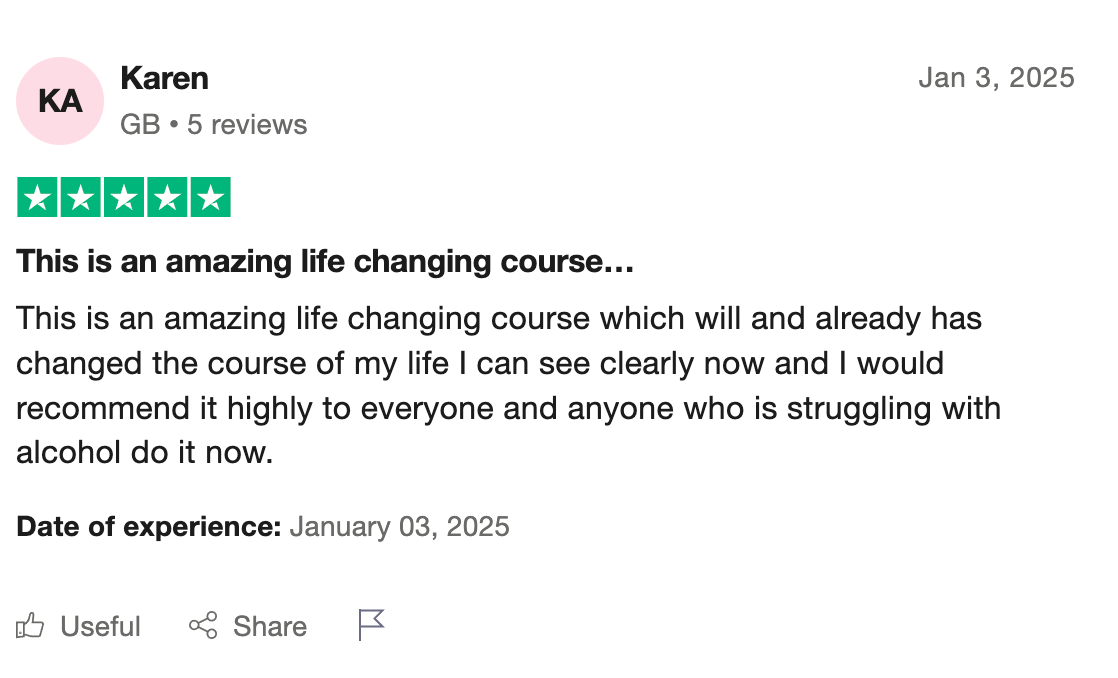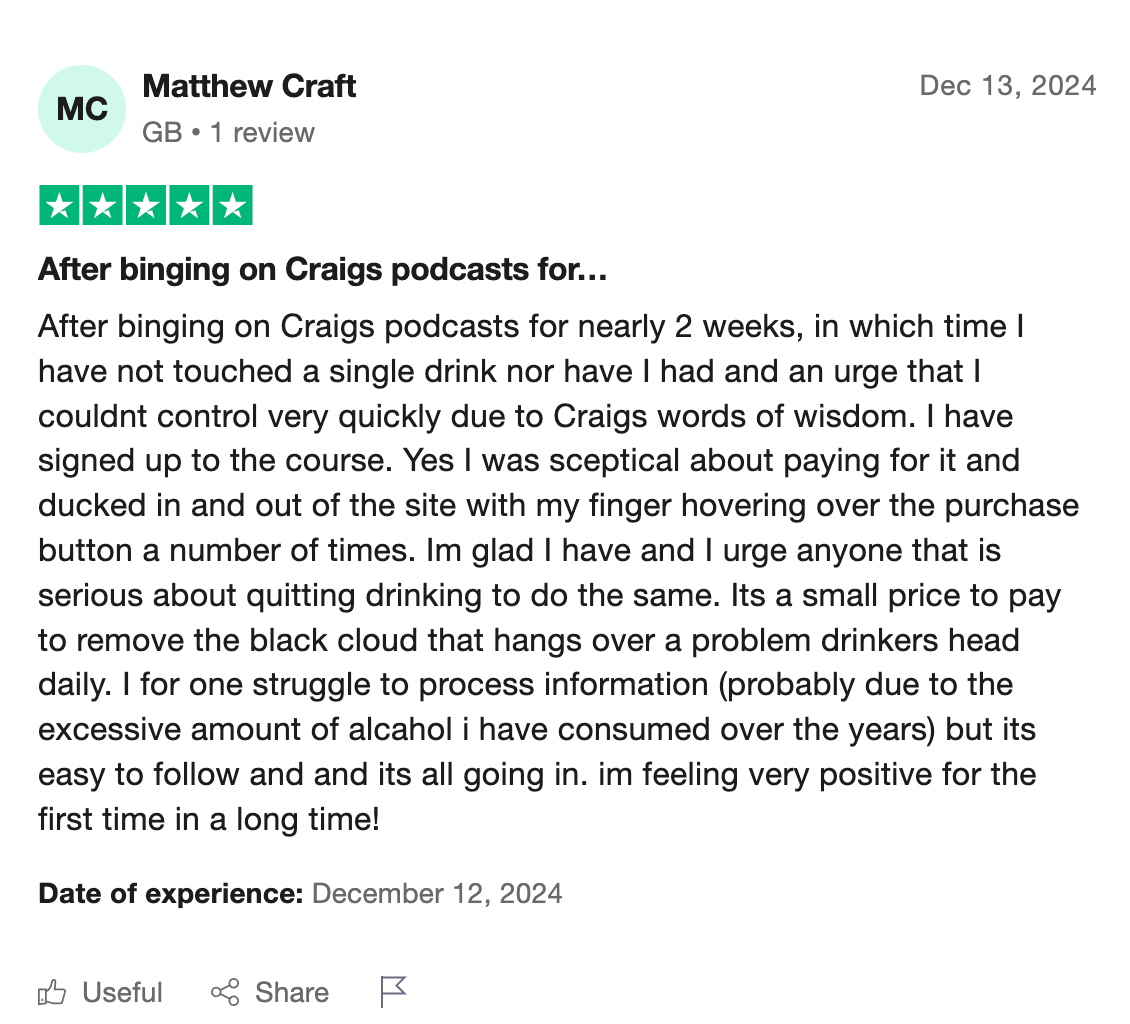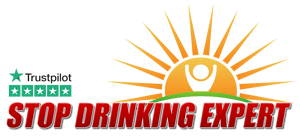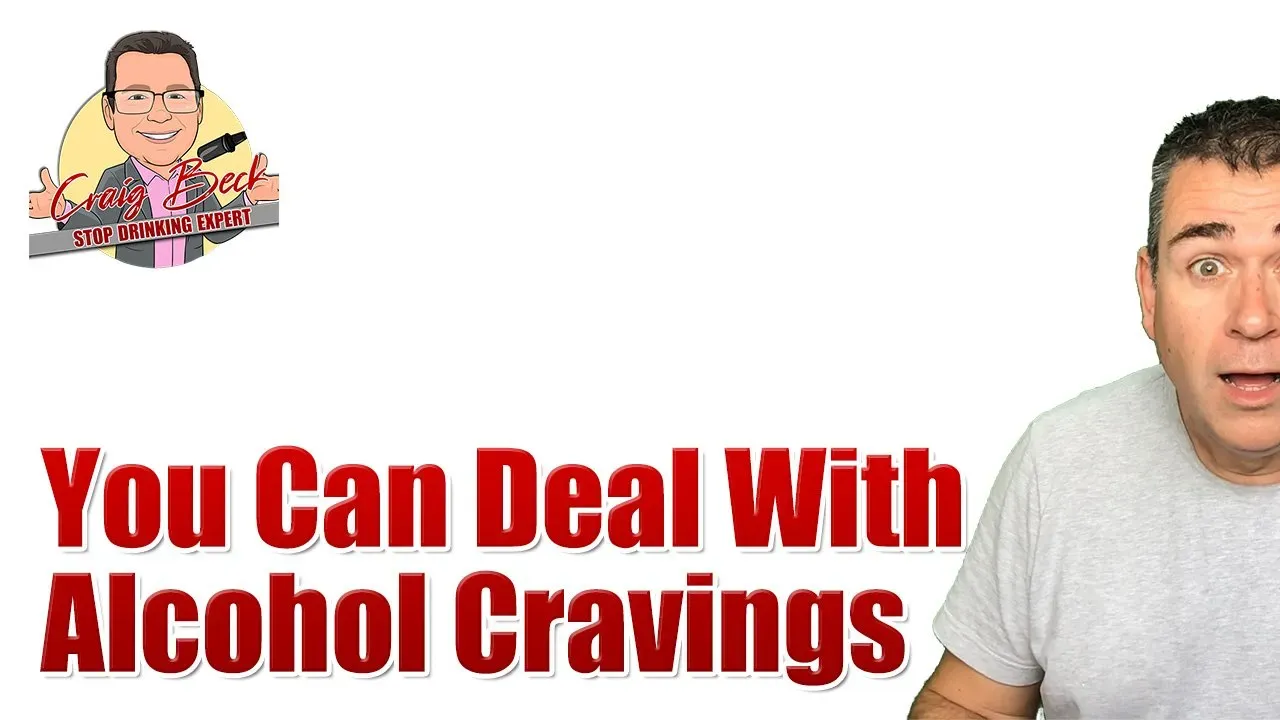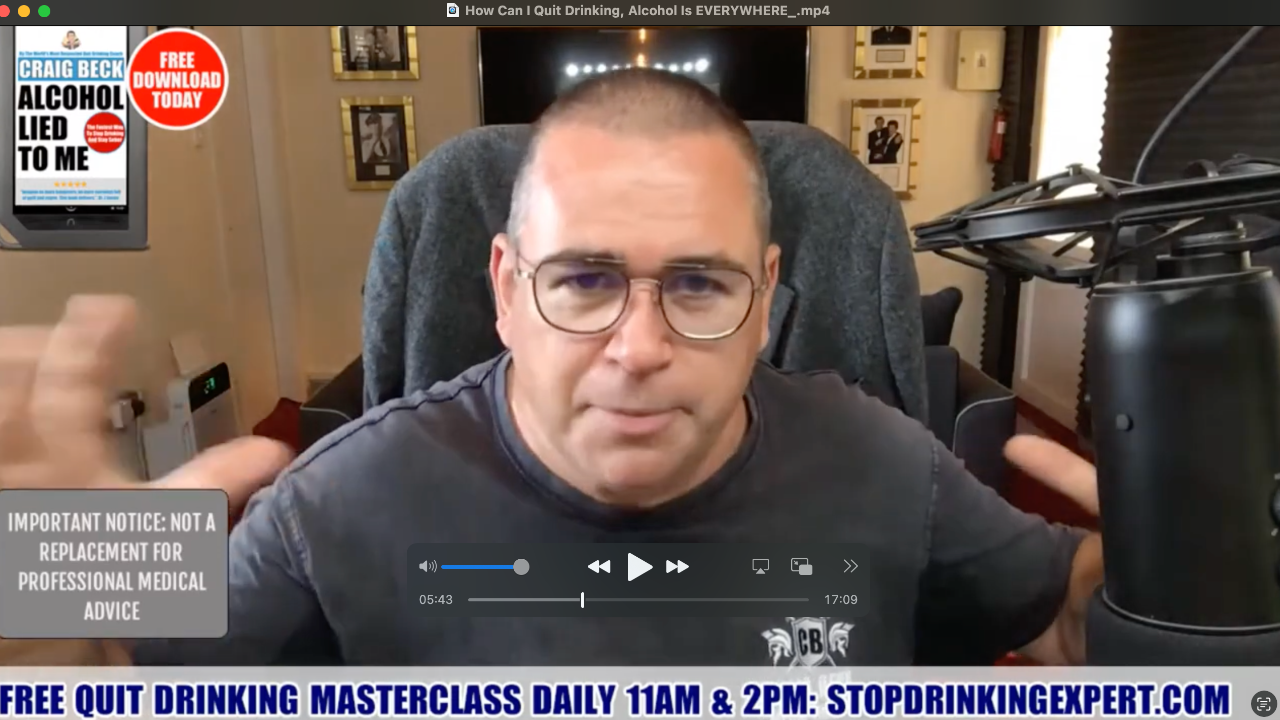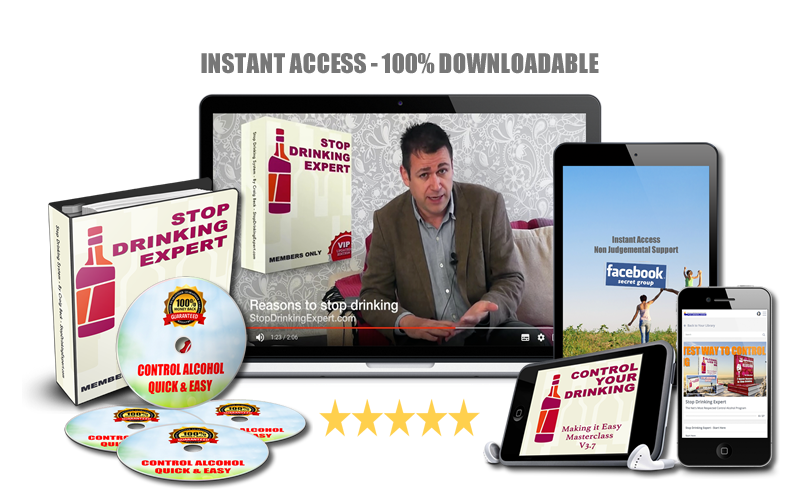Define Alcoholic – How Do You Know When Enough Is Enough?
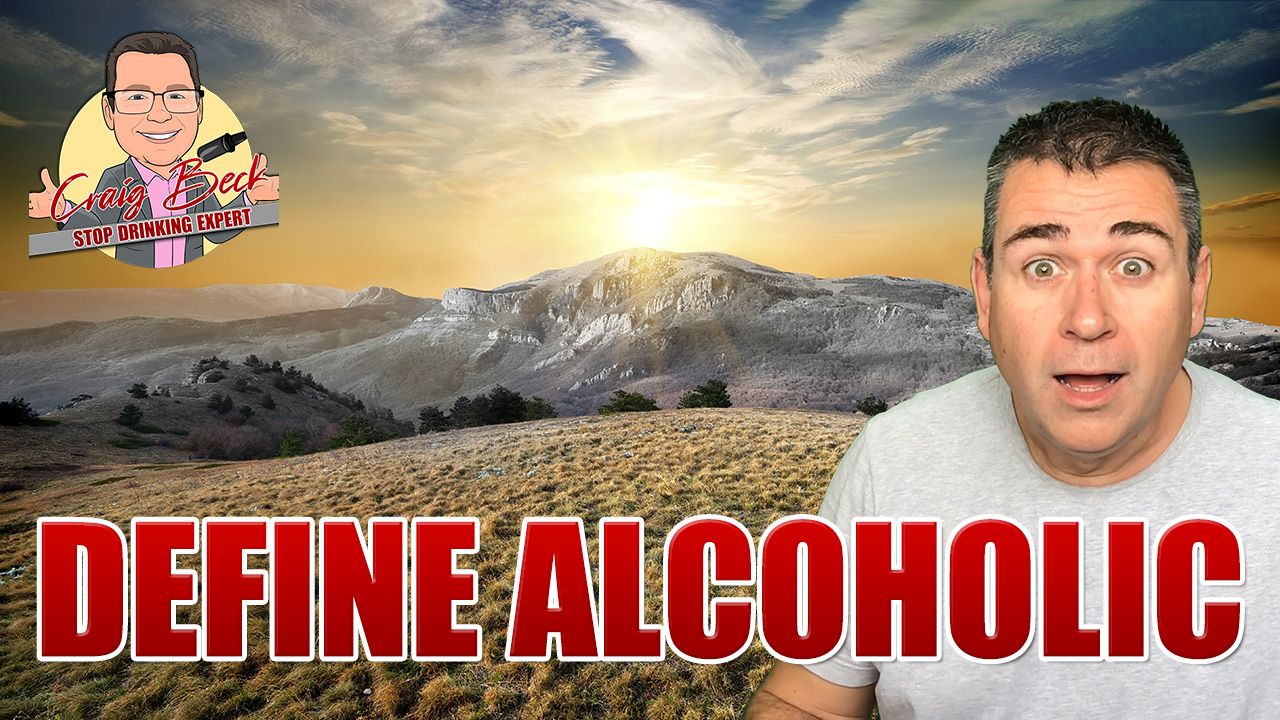
Define Alcoholic – How Do You Know?
Picture an ordinary evening. You clock off work the brain still sizzling like bacon on a skillet. To silence the sizzle you twist a bottle top and watch amber liquid kiss the tumbler. The first gulp melts tension and paints the room a warmer colour. Somewhere in that soothing swirl a thought drifts by. Is this comfort or is this creeping captivity?
Alcohol wears many masks. Advertisers drape it in glamour sommeliers recite tasting notes with poetic flourish and friends hand each other drinks as tokens of loyalty. None of those shiny labels alter the truth that every pour contains ethanol which the body treats like a toxin. The question that haunts countless readers is simple. At what point does routine sipping slip over the line into genuine dependence?
Your answer matters because alcohol keeps a secret scorecard. It tallies heart strain liver wear cognitive fog and emotional fallout long before any outward alarm rings. You might still arrive at meetings on time and pay bills promptly yet notice subtle shifts. Sleep feels flimsy mornings sting and mood swings lurk. Denial whispers that everything sits under control. Reality may differ.
To define alcoholic we must drop old stereotypes. It is not the dishevelled stranger under a bridge clutching cheap spirits. Many high performers cruise motorways in late model cars yet drink enough each night to trip medical risk thresholds. The modern alcoholic often looks successful which makes self diagnosis tricky and admitting the issue even harder.
Counting Units Versus Reading Signals
Governments publish unit guidelines that attempt to draw bright lines. For instance the United Kingdom suggests staying below fourteen units each week while U S advisers recommend no more than two drinks per day for men and one for women. These numbers help policymakers but human bodies ignore paperwork. Some people metabolise alcohol slowly therefore even modest intake churns heavy consequences. Others tolerate higher doses but still accumulate harm over years.
Rather than obsess over arithmetic focus on signals. Do you hide empty bottles to dodge comments. Have loved ones joked about your nightly rituals. Do nerves flare when supplies run low. If work stress prompts an automatic need for a glass that is a flashing amber light. Frequency and purpose reveal more truth than volume alone.
Withdrawal symptoms offer another hard clue. Shaky hands restless sleep vivid nightmares or morning nausea hint that the brain already expects alcohol to feel balanced. That expectation arises after repeated chemical nudges not after one wild party. Routine makes the rule.
Think about tolerance as well. The first time you tried wine one glass possibly spun the room. Months later the same amount barely nudges the needle so you double the dose. Tolerance appears friendly yet secretly flags neuroadaptive change. The brain restructures to accommodate alcohol. That renovation never comes free.
Why Labels Matter Less Than Consequences
A clinic may diagnose Alcohol Use Disorder using eleven criteria. Meeting two earns a mild tag six indicates severe trouble. However the label should not dictate action. If drinking steals joy sabotages health or sinks finances then change becomes urgent regardless of clinical score. Waiting for a doctor to declare alcoholism before adjusting behaviour resembles waiting for a roof to cave before fixing leaks.
Emily learned that lesson the tough way. She managed a busy design studio in Manchester and sipped craft gin each evening to decompress. Within three years she gulped half a bottle nightly. She never blacked out and always arrived at work crisp yet she woke with pounding heart and creeping dread. One Sunday she stumbled upon the article about the hazards of drinking alone. The mirror it held startled her into change.
Consequences also extend beyond the body. Relationships fray when alcohol monopolises attention. Children notice slurred speech and unpredictable moods. Partners feel distance widen. Even social circles full of drinkers eventually judge the person who crosses their unspoken line. The heartbreaking irony is that many people drink to feel accepted only to end up isolated.
Financial drains compound the emotional toll. A mid range bottle per night in Sydney costs more than an annual holiday. Factor in late night taxi rides convenience snacks and potential medical fees and the sum stings. Yet most households refuse to audit those quiet leaks.
Stress Feeds the Pour the Pour Feeds the Stress
Modern life bombards us with pings deadlines and uncertain news cycles. Alcohol feels like a mute button but it functions more like a loan shark. It offers calm quickly then charges interest in anxiety the next day. Researchers at Yale School of Medicine found that alcohol increases cortisol after an initial dip meaning stress rebounds higher. You borrow serenity from tomorrow then repay with panic plus interest.
The loop is vicious. Stress prompts drinking drinking disrupts sleep poor sleep magnifies stress. Round we go. Breaking that carousel starts with acknowledging the false promise in the glass. You do not need iron discipline or monk like abstinence forever. You need one decisive pause long enough to prove life works better without the drug.
During that pause you will confront triggers. Some are external like the sports bar neon or dinner party chatter. Others lurk inside such as loneliness or boredom. Build alternative rituals. Brew peppermint tea and read a thriller at nine. Phone a mate. Walk a noisy dog. These actions sound pedestrian yet they retrain neural pathways more effectively than sheer willpower.
Science backs the shift. Functional MRI studies show that practicing mindfulness reduces craving by dampening activity in the ventromedial prefrontal cortex. Translation—when you observe an urge without acting it loses muscle. Ten cautious breaths beat one reckless gulp every time.
The Health Ledger No One Sees
You already know heavy drinking bruises the liver but the list stretches farther. Regular alcohol inflates blood pressure stiffens heart muscle and distorts electrical rhythms. Cardiologists warn that atrial fibrillation risk rises linearly with each daily serving. For a deep dive scan the piece on alcohol’s hidden cardiac toll. The numbers do not lie though advertisers might.
Hormonal chaos also sneaks in. Men face dwindling testosterone which sabotages strength and mood. Women encounter disrupted oestrogen cycles amplifying anxiety and weight gain. Both genders suffer dulled REM sleep which impairs memory and decision making. The net effect is an ageing process on fast forward. That explains why many who quit look notably younger within months their skin regaining vibrancy as blood flow improves.
Mental health takes equal bruising. Alcohol is a central nervous system depressant although it masquerades as a mood booster. After the buzz fades neurotransmitters swing the other direction like a snapped rubber band. Sadness intensifies. A study in The Lancet Psychiatry revealed that even moderate drinkers doubled their risk of a depressive episode. Small wonder the article Does Alcohol Cause Depression remains one of the site’s most visited.
Immunity sinks too. Ethanol suppresses white blood cell activity leaving you vulnerable to infections and slower wound healing. During a global pandemic that vulnerability transforms from abstract concern into immediate danger. When you choose sobriety you gift your immune army a vital power up.
Testing the Waters of Sobriety
If the idea of quitting forever feels gargantuan start with thirty days. That manageable window offers priceless data. During the first week energy may wobble cravings bark and dreams turn vivid. These disruptions show your biology rebooting. They also highlight dependence level. Severe withdrawal like hallucinations or seizures requires medical care promptly. Never white knuckle through extreme symptoms.
By week two sleep deepens the digestive tract churns more smoothly and mornings brighten. Appetite may spike because dopamine pathways seek new rewards. Feed them with nutrient dense meals not sugar binges. Remember every cell celebrates the upgrade.
At day thirty measure metrics. Blood pressure likely dropped complexion glows and mood steadies. That evidence often persuades sceptics more than any lecture. Many readers then extend the experiment to ninety days because momentum feels thrilling.
Community support accelerates progress. Join the forum at Stop Drinking Expert. Share victories and stumbles. Listening to others exposes patterns in your own thinking. If you crave external accountability announce your goal publicly. Social contracts wield surprising power because no one enjoys backtracking in front of peers.
Tools That Tilt the Odds
Several practical aids make the journey smoother. Start a craving diary. Note time location emotion and intensity from one to ten. Over a fortnight patterns scream off the page. You might spot a 4 PM slump linked to sugary snacks or a Sunday afternoon loneliness spike. Armed with that intel you can plan counter moves like a brisk walk or a call with family.
Replace the ritual not just the drink. Light a vanilla candle and pour chilled soda into your favourite glass. Your brain craves familiarity so offer sensory cousins. Non alcoholic spirits gained flavour leaps lately and many taste testers cannot distinguish them from traditional cousins.
Consider guided hypnosis recordings from Craig Beck. Hypnosis primes the subconscious to rewrite alcohol beliefs. Another option is medication such as naltrexone which blunts the opioid reward surge so cravings shrink. Medication does not absolve mindset work yet it grants breathing room.
Professional counselling unpacks root causes. Cognitive Behavioural Therapy challenges the thought loops that claim wine relaxes you when evidence shows the opposite. A therapist also helps heal trauma that often hides beneath habitual drinking. You deserve that deeper relief.
The Invitation Standing by the Door
You have marched through research anecdotes and strategies yet the real pivot happens when curiosity turns into decisive action. Download your complimentary copy of Alcohol Lied To Me at StopDrinkingExpert dot com now. Thousands across the globe used those practical pages to steer away from pain toward clarity health and genuine happiness. The price is nothing the payoff could be priceless.
If you still hesitate wander through the post about simple tactics to drink less or read the guide on choosing the best time to quit. Each article nudges the pendulum another notch toward freedom. Eventually you will realise the glass never solved stress it merely borrowed peace from tomorrow. Today you reclaim that peace with interest.
Meta description: Unsure whether your nightly drinks signal harmless pleasure or hidden dependence? Discover clear signs, health truths, and proven strategies to know when enough is enough and download your free copy of Alcohol Lied To Me at StopDrinkingExpert dot com.
References
- National Institute on Alcohol Abuse and Alcoholism. Alcohol Facts and Statistics. 2024.
- Ashford J et al. Alcohol intake and atrial fibrillation risk. European Heart Journal. 2023.
- Grant B & Dawson D. Diagnostic criteria for Alcohol Use Disorder. Journal of Clinical Psychiatry. 2022.
- Sinha R. Stress response and alcohol craving. Yale University School of Medicine. 2021.
More Helpful Quit Drinking Advice
Does this sound familiar?
- Drinking to escape stress and to cope with the pressures of life?
- Waking up full of guilt and regret that you drank again last night despite promising that you wouldn't?
- Hiding alcohol or the evidence of your drinking?
- Feeling like you are living a double life because of your drinking?
- Creating silly rules to try and control your drinking (e.g., I will only drink on special occasions)?
The good news is that you are not alone; the better news is that I can help.
Meet Craig Beck, The World's Most Respected Sobriety Coach
Craig Beck, better known as “The Stop Drinking Expert”, turned a 20-year battle with alcohol into a roadmap for lasting freedom. The bestselling author of Alcohol Lied to Me and The Sobriety Secret discovered that traditional routes like Alcoholics Anonymous can feel embarrassing, public, and all too often, entirely ineffective.
His method is different. It shows you:
- Why you drink in the first place—the hidden brain loops alcohol hijacks.
- How to switch off cravings before they even start.
- A willpower-free exit plan you can follow privately, at your own pace—no labels, no awkward meetings, no medication.
Hundreds of thousands worldwide now wake up clear-headed, proud and at peace thanks to Craig’s approach. Will you be the next?
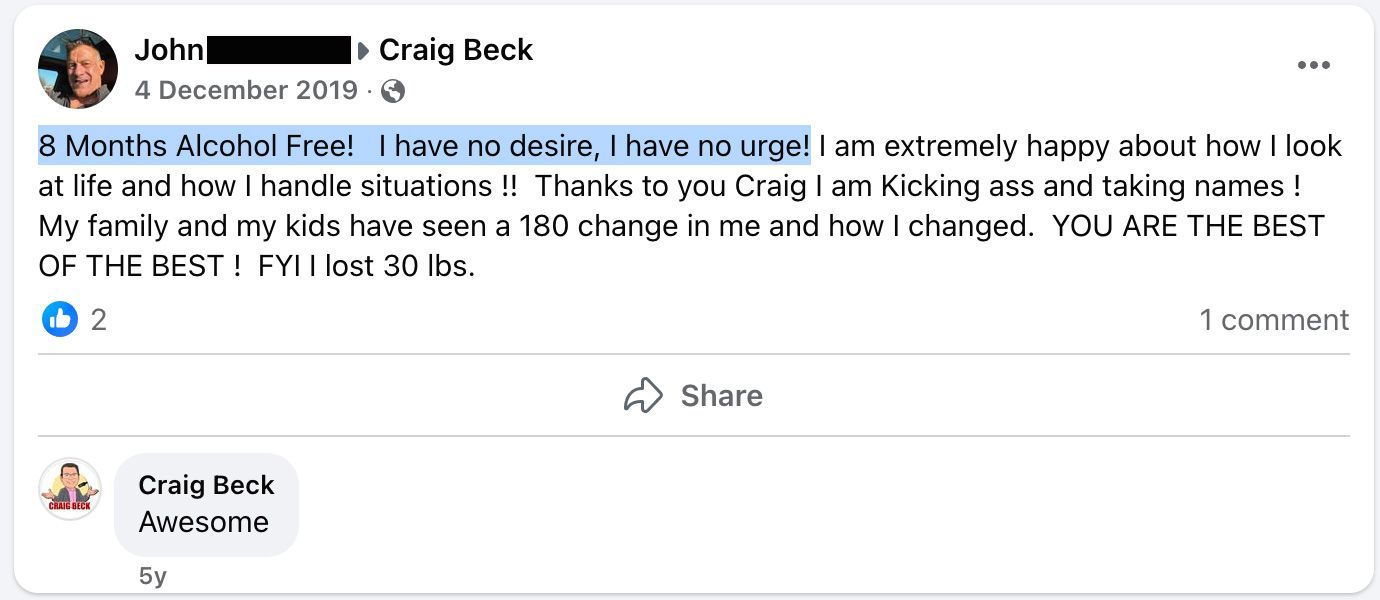
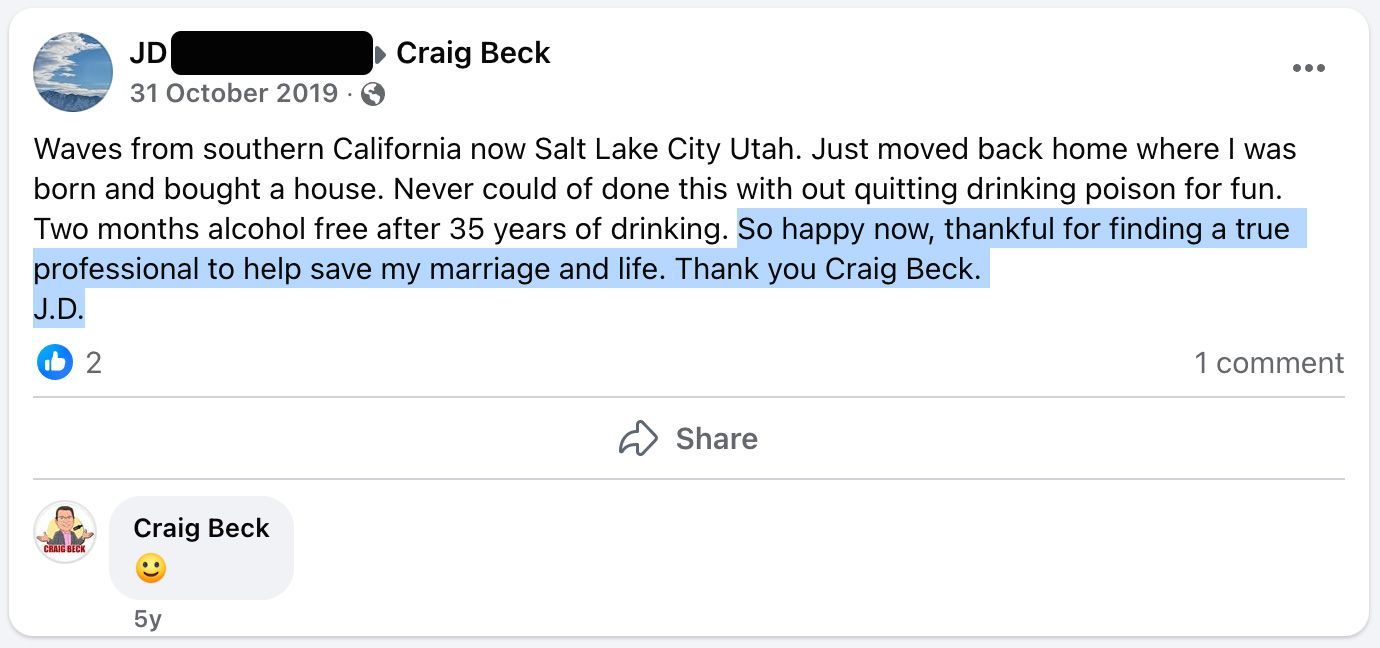
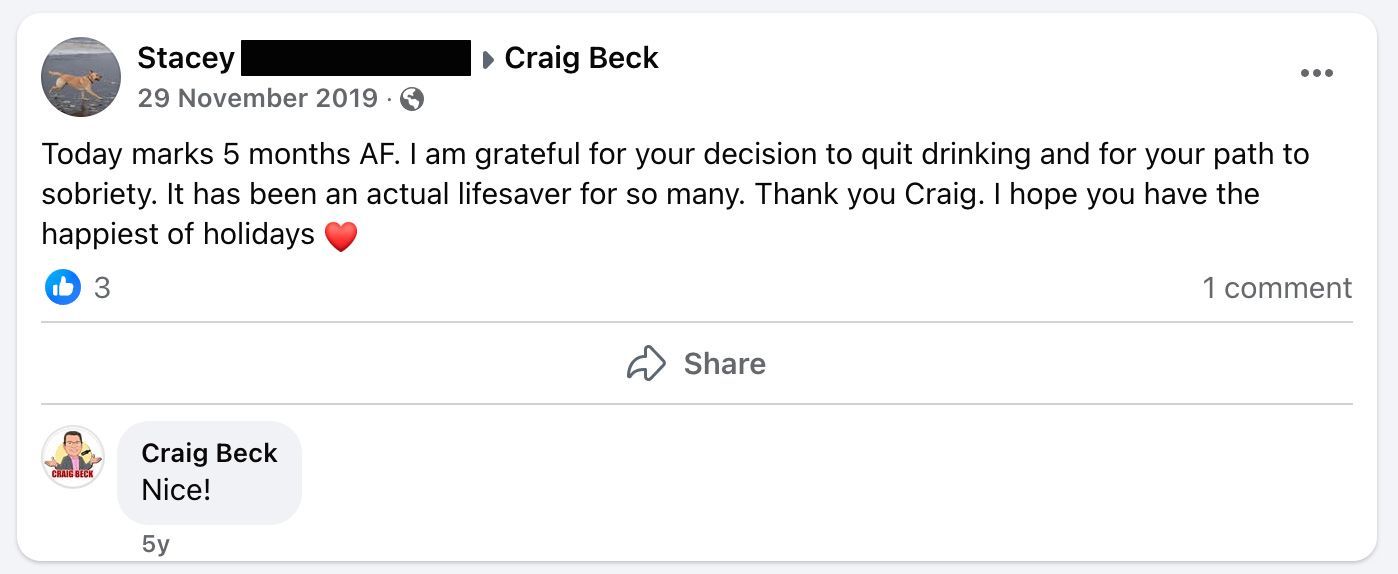
"Effortless Sobriety: The Proven Path to End Problem Drinking"
No one likes asking for help with their drinking—it feels personal and heavy. But if willpower alone hasn’t worked, it’s not because you’re weak. Research indicates that relying solely on grit is unsuccessful approximately 95 percent of the time. You’ve simply been using the wrong tool for the job.
Download my free ebook or decide now get started with the full course and learn:
- Why the game is rigged: how alcohol rewires your brain chemistry and makes “just trying harder” almost impossible.
- A science-based exit plan: practical steps that work quickly, privately, and on your terms.
- No awkward meetings or risky meds: forget the gimmicks—this is about smart strategy, not shame.
`Are you ready to step onto solid ground? Get off the fence, take action, and start taking back control—quickly, confidently, and without the struggle.
Over 250,000 Happy Sober Clients Can't Be Wrong:






